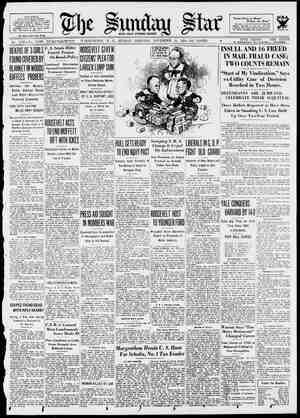Evening Star Newspaper, November 25, 1934, Page 73
You have reached the hourly page view limit. Unlock higher limit to our entire archive!
Subscribers enjoy higher page view limit, downloads, and exclusive features.
m E‘) PART 6. ! ¥ WASHINGTON, D. C, e Swnday Star Magasine BY BRUCE CATTON. OU wouldn't think they had much to be thankful for—those early Puritans who set aside a day for prayer and feasting to express their thanks to God for His mercies. To be sure, they had come through a horribly difficult year, and they were beginning to see that the worst was over. They had found that the weather was not going to kill all of them in the cold Winter months, that the Indians were not going to swoop down and drive them into the sea, that they could really tame this wild new land and make it produce food, clothing and shelter. They had found, in other words, that they could build a new homeland for themselves in America if they were brave and enduring enough—and so, being de- vout folk, they offered their thanks to Heaven for it, and began a cus- tom which is followed to this day. But when you look back you can see NOVEMBER 25, 1934. = [ e R T &g{htt 1621------,-1554 that there were plenty of things there to frighten and discourage them, if they had stopped to think about them. They occupied a little fringe of land on the very edge of one of the greatest continents. At their backs was the sea —wide, stormy, menacing. Before them was the wilderness—one of the most tremendous reaches of wild land that ever existed. Dense forests stretched away to the west, for league on league. In the Sum- mer the forest was a dark hiding place for lurking Indians; in the Winter it was a frost-bound desolation, swept by freezing gales, a very Siberia of lifeless emptiness, lying just beyond their little farms. ND all of this, to the men of those days, must have seemed infinite. No man knew what lay beyond the wilder- ness. It was a perpetual menace. an enormous shadowland that dwarfed their tiny settlement to pigmy dimen- sions. Any thinking man, surveying the state of things in the early 1600’s, must have concluded at once that the task of conquering this continent was utterly impossible—a hopeless endeavor that could only result in defeat and death for those fool enough to try it. But the colonists, as we know, re- fused to be frightened. Their little cabins were there on a nar- row strip of cultivated land between sea and wilderness, true enough; the In- dians might at any moment come down in a flood with knife and firebrand and annihilate them; the power of France, far to the north, was a menace never to be forgotten. But the Pilgrims appointed a feast day, offered reverent thanks to God, en- joyed the bounty that they were com- pelling the rugged land to surrender to them—and paved the way for man’s greatest triumph over hostile nature. All the future was there, in that day of Thanksgiving—the future of a wil- derness tamed and made fertile, of hos- tile tribes routed. and made harmless, of busy cities and pleasant farms and com- fortable homes and broad highways, reaching to the west beyond imagining, a great land where the human spirit could be free and triumphant. All of that was implicit in the first Thanksgiv- ing day; it became possible, that is, be- cause those early settlers were tough enough to count the blessings they had, rather than frighten themselves into de- feat by gazing too long at the surround- ing dangers. SO MUCH for the Pilgrim fathers, back in 1621. Now let's bring things down to the year 1934. Like the Pilgrims, we are between a wilderness and an ocean these days. We find ourselves in a position where we must go forward or give up, conquer or die. The ashes of the dead years are Continued on Third Page Features 16 PAGLS.
